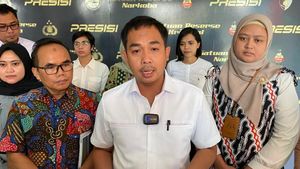JAKARTA - Commission X of the DPR encourages the involvement of Law Enforcement Officials (APH) to become a coach for students in schools, as part of Counseling Guidance (BP). The involvement of APH to overcome violations committed by students, including bullying behavior, which is currently rife.
Deputy Chairman of Commission X of the DPR, Dede Yusuf assessed that territorial coaches such as Babinsa and Bhabinkamtibmas can overcome various forms of 'caughty' students by providing educational discipline. Because Babinsa from the TNI and Bhabinkamtibmas from the National Police are elements of the apparatus who are in direct contact with guidance to the community.
"The BP teacher should be taken from law enforcement, it could be Bhabinkamtibmas or Babinsa. But it must be mutually agreed upon, so that disciplinary enforcement in the school environment is carried out in accordance with the main functions," said Dede Yusuf, Tuesday, October 3.
Dede assessed that the role of current teachers has changed following the times. Unlike the past where teachers can firmly impose sanctions on students, teachers today can only focus on academic teaching and counseling.
For various reasons and factors including human rights matters (HAM), teachers now seem to ignore student delinquency. Dede said that many teachers were reluctant to give disciplinary sanctions to students for fear of being reported to the authorities by their parents.
Teachers or school principals are generally afraid to do disciplinary action because they are afraid to be complained to law enforcers. And teachers never learn how to do the right physical sanctions," said the legislator from the West Java II electoral district.
"Finally, teachers choose to let go if there is a problem because there are often teachers who end up dealing with the law," continued Dede.
SEE ALSO:
Dede also encouraged the revision of Permendikbud Number 46 of 2023 concerning the Prevention and Handling of Violence in the Education Unit (PPKSP). Because according to him, the regulation has not been maximized in preventing violence in educational units.
"The rules in Permendikbud are now weak in implementation in schools. I think the Permendikbud must agree on education and discipline. So discipline is educative," he said.
Dede assessed that the number of cases of violence or bullying involving school children occurred because currently the implementation of disciplinary distribution in schools was very lacking. Even in Permendikbud Number 46 of 2023, there are no strict sanctions for violations.
"The function of supervision and education is released into the school unit. In fact, many school units have not received socialization or advocacy. Many teachers, if I ask them, they don't dare to act," said Dede.
Dede said that children would feel they had no boundaries if there was no strict discipline. "What is developing today is that children think that what is done is normal because there is no law, there are no sanctions either," he said.
The involvement of elements of APH is considered to be more effective in disciplining students. The function of APH is as a supervisor in student development, especially in terms of imposing disciplinary sanctions. Moreover, currently the role of BP in schools is not so much felt.
"To overcome violations at school, there must be a BP teacher. In the past, BP teachers were feared. So now it can be with the help of Babinsa or the Police. So that later if the teacher throws lime, the next day they are not immediately called by the police," said Dede.
"Teachers now don't give punishment, because they are limited to teaching. BP is also more on counseling. There is no law on disciplinary sanctions, so there is nothing to be afraid of at school," he added.
Dede also gave an example of a recent viral incident where a student received firm advice from TNI personnel to enter school. In the video circulating, the student can be seen listening to omelan' from members of the TNI carefully and then promises not to mess around anymore.
In the video narration, it is stated that the child is quite stubborn because he rarely goes to school. Both parents and teachers were never heard of, until finally TNI personnel intervened to give the child a warning.
According to Dede, the presence of APH elements that are known to be firm is necessary so that school children are afraid to commit violations. Even so, the involvement of APH elements must be a mutual agreement and contained in official regulations such as Permendikbud issued by the Government.
"It must be agreed between the school, the parent committee, and law enforcement. So later law enforcers can both understand the derivative of the Permendikbud, his name is educational discipline," explained Dede.
In addition to the agreement on the involvement of APH elements in disciplinary education, all stakeholders must also agree on the sanctions given for student violations. According to Dede, in Permendikbud it must also be agreed on the category of violations and sanctions.
For example, if you grab the sanctions, insult or hit the sanctions. There are categories and levels. If you die, of course there will be penalties, even if the children of the law specifically use the juvenile justice system," said the former Deputy Governor of West Java.
"The point is that it is agreed what form of educational discipline is, then what sanctions are given in which schools are allowed, and which ones are not allowed," continued Dede.
Enforcement of discipline in schools is considered important as an effort to educate children to grow into a superior generation. Dede said the characteristics of the superior generation are not only seen from academic achievements, but also from the character of children.
The English, Chinese, Japanese, Arabic, and French versions are automatically generated by the AI. So there may still be inaccuracies in translating, please always see Indonesian as our main language. (system supported by DigitalSiber.id)











